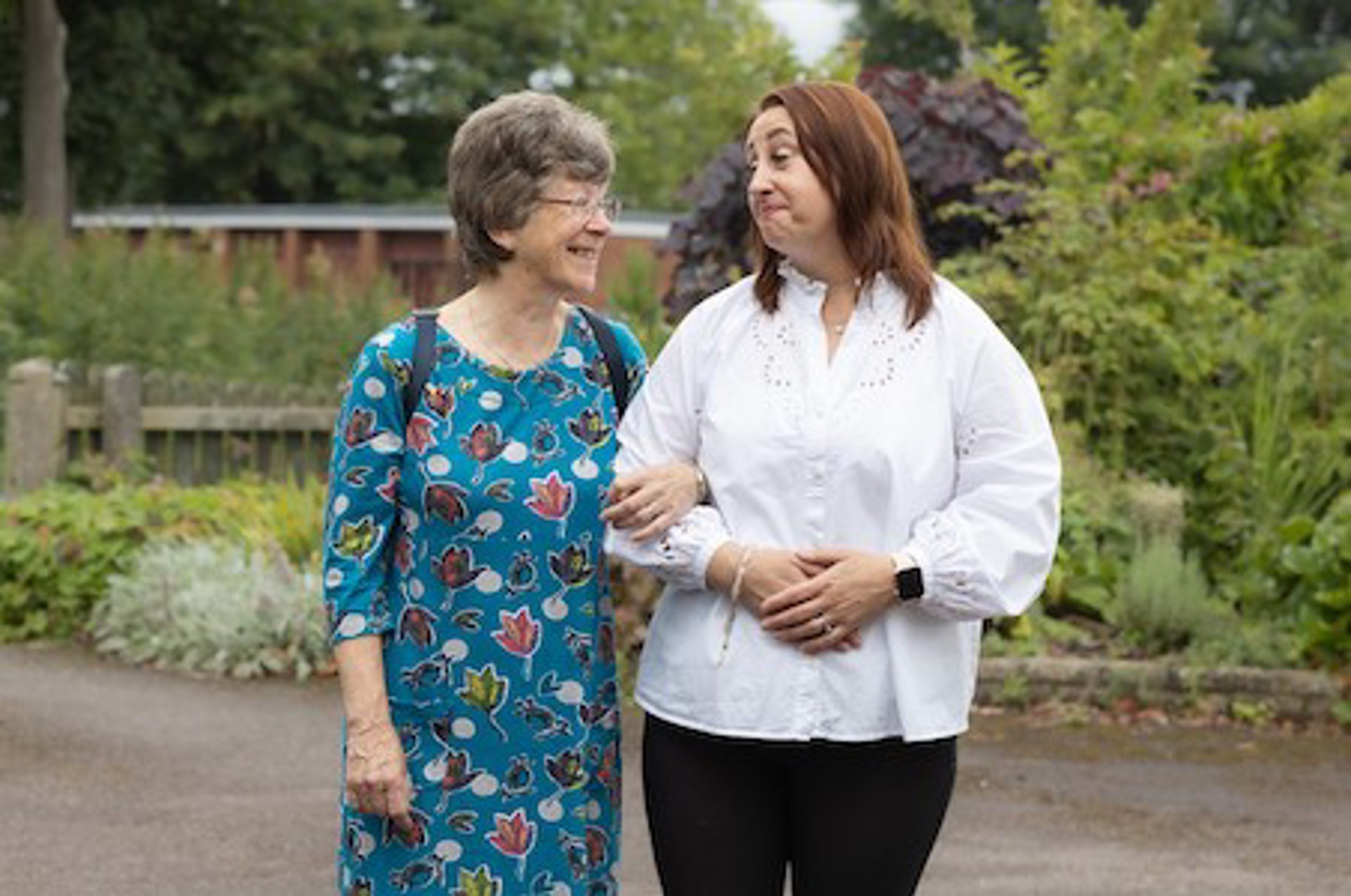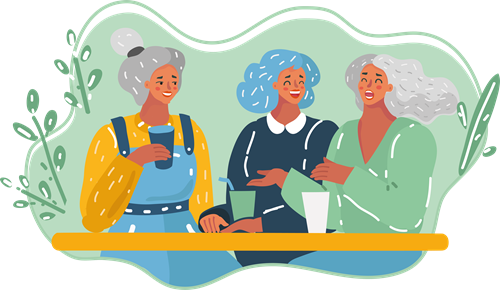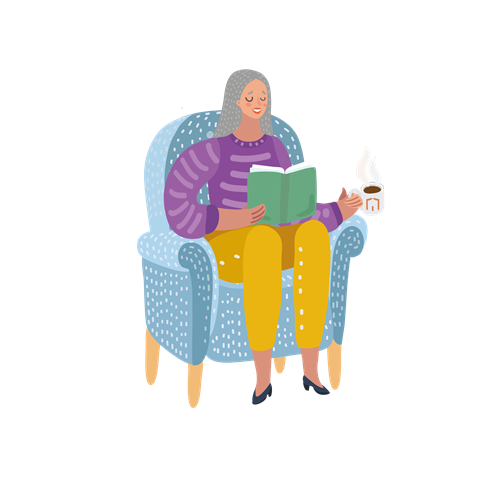Menopause Awareness and Advice
We believe in the importance of informing and supporting our CareGivers at all stages of their life. This helpful guide explains what menopause is, how it can affect employees and advice for handling menopause in the workplace.

- National Site
- Information & Support
- Menopause Awareness
Why is menopause awareness important?
Over half the population will experience menopause. Although menopause will typically be experienced by women and people who have menstrual cycles, everyone should be aware of its effects and educate themselves, so they can support others going through it.
Menopause has traditionally been a taboo subject that many are uncomfortable discussing. However, as the subject of menopause becomes more normalised, it will become easier for those struggling to talk and share their feelings and easier for others to listen and provide support.
Menopausal people are the fastest-growing demographic in the workplace. 63% of women say their menopause symptoms have negatively impacted their work. It is important to help these staff do their job confidently and effectively throughout menopause.

Signs and symptoms of menopause
Due to changes in your hormone levels, there is a wide range of symptoms you may encounter while experiencing menopause. Everyone’s journey will be different, from duration, type of symptoms, severity of symptoms and age at onset.
- Mood changes/anxiety
- Heart palpitations
- Sleep issues
- Loss of confidence
- Night sweats
- Tiredness
- Difficulty concentrating
- Headaches
- Hot flushes
- Needing the toilet more
- Poor memory/brain fog
Living well with menopause
Some of the physical and mental symptoms caused by menopause can make daily life difficult to manage - but there are lots of practical ways to make it that bit easier, at home or at work. Whether it’s keeping a cold pillow at the bottom of your bed, swapping out caffeine for water or finding someone at work to confide in. Our Pause for Menopause booklet is full of simple yet effective tips and advice to help you manage your menopause. To learn more about how we support our team members and how you can make menopause more manageable for yourself.
Download the menopause booklet below

Gill | Right at Home Guildford & Farnham"Menopause isn't a dirty word and it isn't something to be feared - it's a natural part of ageing. You should be proud to be having menopause, you shouldn't have to keep quiet or feel less able than anyone else to do your job because its a natural part of life and part of who we are."
What is perimenopause?
Perimenopause means “around menopause” and refers to the time that your body begins the change through menopause.
Signs you are perimenopausal can include:
-
Period irregularity and changes in the severity of period pains
-
Hot flushes and sudden changes in body temperature
-
Vaginal dryness and changes in sex drive
-
Sleep problems and night sweats
-
Mood changes and unexpected emotional state
Perimenopause questions answered
When does perimenopause start?
The average age to be perimenopausal is 40 to 45 but can vary from person to person.
How do I know if I'm perimenopausal?
Signs of perimenopause are often similar to menopause symptoms, however, you will typically continue to have periods during this time.
What's the difference between menopause and perimenopause?
The difference between perimenopause and menopause is that perimenopause refers to the time around menopause when you start showing the signs and symptoms. You will gradually have less of the hormones that control your periods - these being oestrogen and progesterone. Whereas ‘menopause’ is the medical term used when you have stopped your menstrual cycle and have not had a period for 12 months or more.
Did you know?
60%
of women experience symptoms that result in behaviour changes

1 in 4
women will experience debilitating symptoms

45-55
is the typical age menopause begins

Menopause in the workplace
Four in five menopausal employees believe menopause had a moderate to extremely high impact on their work performance, while over a quarter have considered quitting work because of their symptoms.
Would you like to join our friendly and supportive team? View Right at Home's available opportunities today.

Menopause at work
How can menopause affect you at work?
The physical symptoms of menopause can make it difficult for you to continue your daily routine as you are used to. They can also have a knock-on effect on your confidence which in-turn can have a huge effect on your enjoyment of work and your career progression. Common symptoms such as brain fog and difficulty concentrating can have a direct impact on your capability to complete work-related tasks.
Without the right support, at the right time, you may not be able to reach your full potential and may even feel incapable of continuing to work in your current role. Research shows that one in four people experiencing menopause have considered leaving their job because they have either not felt supported or feel incapable to continue working.
Right at Home promotes an open and supportive working environment for all of our team members, including those who may be living with menopause and its effects. If you want to find a supportive employer and join an understanding team, take a look at our current roles and give your local office a call today.
How to deal with menopause at work
There are many ways to deal with the effects of menopause in the workplace.
- Try talking to your manager about how menopause is affecting your working life
- If you can’t confide in your direct line manager, find a colleague who will listen and support you. You do not have to discuss any personal symptoms that you don’t feel comfortable discussing
- As some people find it a difficult subject to raise, they find it helps to keep a diary of symptoms and effects it has on their work to help lead the conversation
- Work with your employer to make reasonable adjustments that will alleviate some of your symptoms - you can find some practical tips in our Pause for Menopause brochure
- Speak to your GP about potential treatments that could make your menopause more manageable
Practical menopause tips for work
Practical tips you take to make menopause in the workplace more manageable can include:
- Ask for a desk fan
- If your desk is in a particularly warm area of the office, discuss the option of moving
- Take regular breaks
- Let someone know that you may need to take more toilet breaks than usual
- If you can, look at working flexible hours
- Write to-do lists to help you remember tasks
- Keep bottles of water in the fridge to drink throughout the day
- Ask for quiet work stages and rest areas to reduce noise and fatigue symptoms
Working in social care during menopause
Working in social care during menopause could offer you a supportive and understanding environment. The social care sector is trained to go the extra mile to look after other people and their wellbeing - this means for team members as well as for Clients. Being surrounded by people who listen and care every day could help you feel empowered throughout your menopause journey.
Roles in social care, and especially in homecare, offer flexible working hours which can often work well when symptoms of menopause make daily life difficult to manage. Homecare work also offers the opportunity to work in close-knit, understanding teams, which can provide an extra support network when you need it.
How do you know menopause has ended?
Postmenopause refers to the period of time once your menopause has happened where your symptoms decrease in severity. Medically, postmenopause is defined by one year since the individual experienced their last period. However, as with all stages of menopause, every journey is unique and some people may continue to experience symptoms during postmenopause.
Postmenopause
How long does postmenopause last?
A person will normally reach postmenopause between the ages of 51 to 55, but this changes from person to person. Once you have entered postmenopause, you will remain in that stage for the rest of your life.
Postmenopausal symptoms
In postmenopause, you may still experience some common menopause symptoms, including:
- Hot flushes
- Night sweats
- Mood changes
- Vaginal dryness
- Changes to sex drive
Life after menopause
Many people describe feeling more physical freedom after menopause, as many of the symptoms become less severe and often disappear completely. Some of the more limiting and painful symptoms of menopause such as periods and hot flushes no longer affect individuals and many find it easier to maintain a consistent, healthy weight too.
Lots of individuals also describe feeling more confident in their lives, bodies and relationships as menopause comes to an end. As some of the mental and emotional effects of menopause such as anxiety and depression start to ease or become less severe, many describe it as a 'new lease of life'.
Thanks to this new found confidence, many individuals have gone on to find new career opportunities or create successful businesses after menopause.
However, you don't need to wait until after menopause to begin a new career - find an employer who understands menopause and supports their teams through every step. That's exactly what we do here at Right at Home - with menopause training, an open environment and supportive team members, get in touch and don't let menopause choose your path for you!

Alison | Right at Home Solent"I'm so proud of myself for getting through my menopause. I love myself and I feel like I got lost somewhere but I'm back. And it's proof that you can get through it, you will get through it. Just ride it, own it, learn about it and love yourself for being able to get through it."
Menopause information
For more menopause related advice, information and guidance, take a look at our blogs and articles below
Menopause makes a difference
Join a company that cares
Right at Home UK is a flexible and inclusive employer that offers top rates of pay and flexible work patterns. We believe in supporting all of our employees to be the best that they can be at all stages of life by offering the most relevant support when it is required.


